We gathered in the fall of 2022 to think about some of the ideas from a small but hopefully growing consortium called Deeper Learning. Perhaps, it’s a flawed name (deeper than what? shallow learning? who wants that!), but for the sake of movement building, we embraced it. Jal Mehta, my colleague from Harvard Graduate School of Education, joined us. His book, written with Sarah Fine, In Search of Deeper Learning, has had a positive impact on many school leaders. We believe in the competencies of the movement, which equate to good teaching and learning and include: critical thinking and problem solving, collaboration, content expertise, self-directed learning, effective communication, academic mindsets. Again, who could disagree with these fundamental ideas for classrooms and young people? Nevertheless, across our country these competencies seem to face push back.
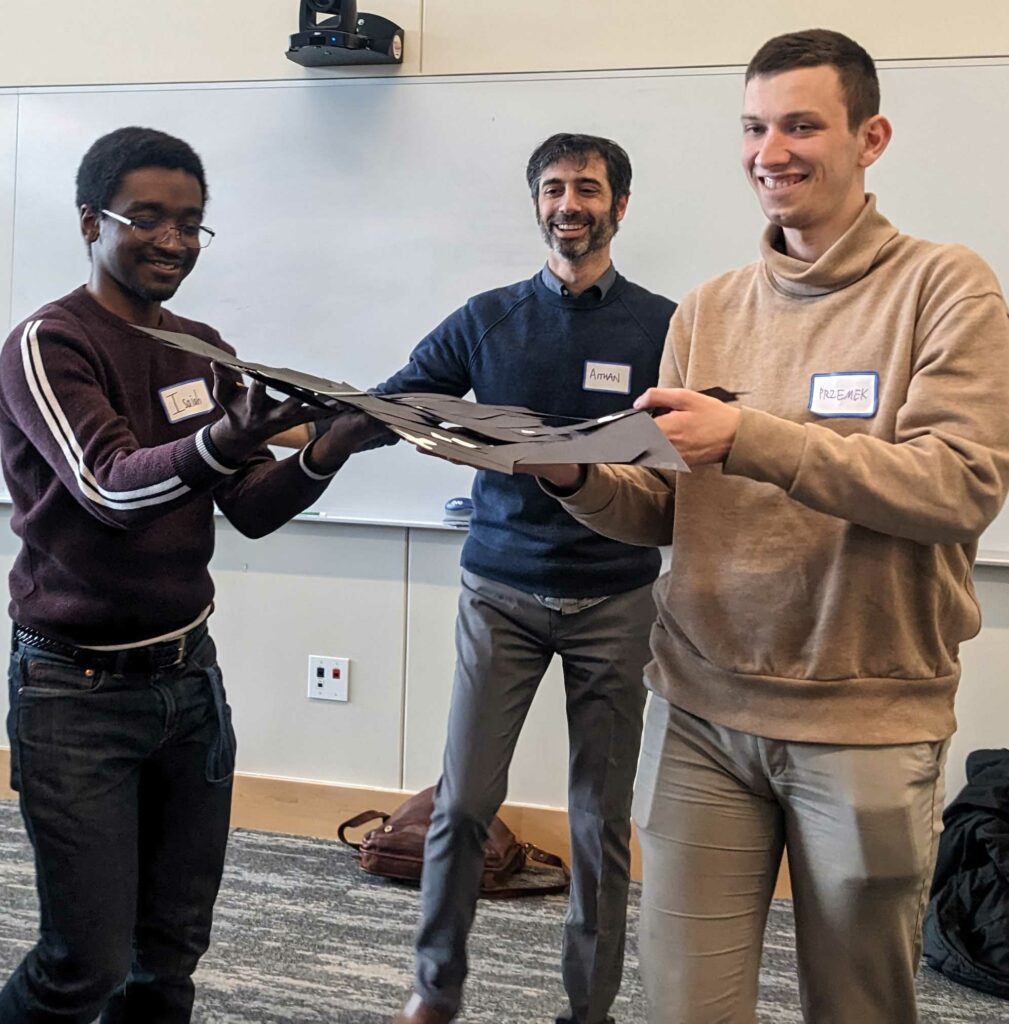
Twenty years ago there was controversy about the Coalition of Essential Schools (CES) which is now defunct and the Ten Common Principles that defined that organization. Goals should apply to all students; Less is more; Student as worker, teacher as coach were particularly disagreeable for many. I never understood why. Deeper learning is the current moment. We are embracing it.
Aithan Shapira, whom I’ve had the pleasure of working with over the past five years, volunteered to lead a two day seminar to consider how educators can facilitate transformation and provide support to one another and our schools. Along with my colleague and former mentee, Heidi Cook, we invited a group of twenty four individuals to disrupt the status quo and learn how to effectively facilitate deeply transformative experiences. People showed up from a broad range of experiences, backgrounds, countries and regions: Vietnam, India, Japan, Poland, Argentina, Maine, New York, Vermont, Massachusetts, Mexico. We gathered as leaders, principals, teachers, artists, organizers– both seasoned and newly minted educators. The range was invigorating.
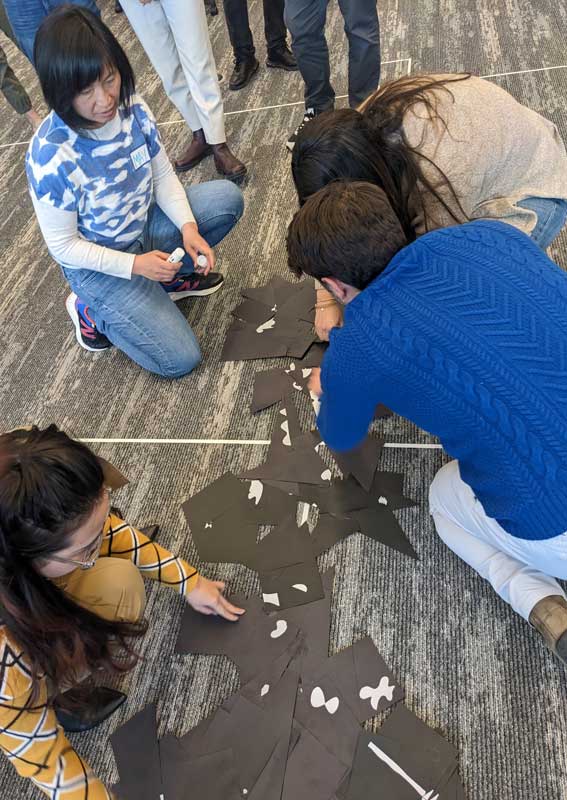
Like many current educators, especially after living through and with the COVID-19 pandemic, we are looking for a community of practice where we can learn new skills, share confidentially about our current situations, and practice in real time the very ideas and ideals that we demand in our schools, classrooms and organizations– difficult as that may be. We know we need to begin with ourselves and one another.
Through a series of activities and exercises we considered ways to facilitate transformation. I know it sounds amorphous and even “fluffy,” as one participant said, but as I look back, I realize we really did learn and experience both expert and emerging facilitation skills. We appreciated the framework Aithan introduced us to which begins with experience, moves to reflection, then experimentation and finally encourages framing and implementation. So much of our professional development work in schools, and even in our classroom teaching, ignores the first three phases and jumps right in with framing and then moves to implementation. It was quite different to start experientially. For most of us it was a welcome relief, even if it made us uncomfortable.
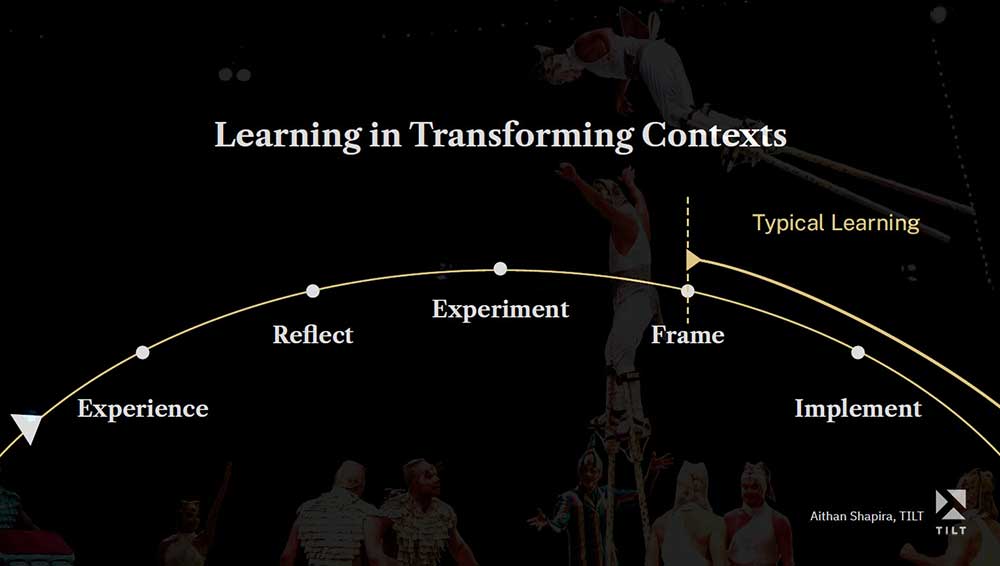
We also experimented with polarity theory, describing the continuum, for example, that exists between knowing and not knowing, considering how every point on that continuum can exemplify positive and negative attributes. Similarly, we thought about the continuum between showing up as an individual and as part of a collective. Polarity helped us see the advantages and disadvantages of each. We could see how we could move between quadrants to keep our actions productive. If we are finding ourselves in a place that is less productive, how do we use that momentum to move toward the other end of the continuum and continue to progress? How do we understand and embrace letting go (the not knowing) at the same time as we commit to reframing questions, take spontaneous action, plan for sustained action, and practice conflict resolution? We discussed that sometimes we have to micromanage and complete our activities in siloes, but can we bring an awareness to when that stance creates stagnation and complacency?

Here is how some participants described the experience:
- I felt held, inspired, challenged, and whole by 5:00PM on Saturday. I looked around and felt that I was among my people. And that is something I had not felt in a “work” setting in, forever. I am grateful I was invited to this experience. Ideas have been bubbling up ever since, and the one that’s bubbled over for me is that we did nothing, so that we could do everything. I truly couldn’t explain what made it work, but it felt like it had the magic “it” factor that is so often skipped over in any organization, community, or school.
- Firstly, it felt great to be invited; It made me feel valued and excited. I appreciate that the experience achieved the objective of seeing myself and others differently. I loved both the invitation and commitment to authenticity because, often, people quit when it gets complicated. I am not at my personal best, but the group validated my contributions and made space for my whole self, including my imperfections. I would adjust or make more visible accessibility options for those with physical or neurological differences. Gender-neutral bathrooms? How can pronouns be addressed?
- Really enjoyed the experience. It was exhausting… in a good way. I loved entering the experience with no knowledge of the agenda. It was freeing and reinforced my stance as a learner. I would have liked to have had an opportunity for the racial and ethnic individuals present to have had an opportunity to process the experience in affinity groups.
- What worked was the serendipity, and the courage of the group. There were some very powerful moments of folks opening up and sharing their “second stories.” The individual activities were less impactful than the opportunities we had to organically talk, dream and strategize. Momentum and networks grew.
It’s that last phrase: Momentum and networks that we are committed to sustaining.
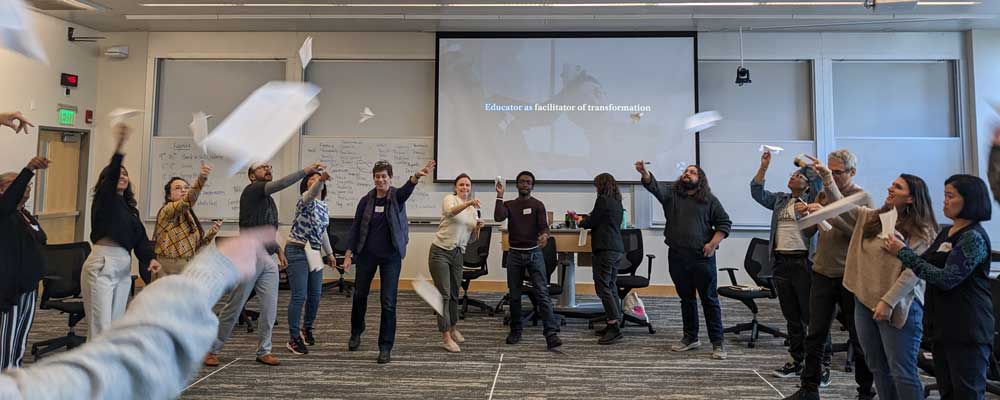
What might we do over the course of a year, two years, or more, to curate a series of experiences that would establish a loose network of the willing?
How can we continue to deepen our understanding of educators as facilitators of transformation? What might we do next?
Our name doesn’t matter: Impact Schools, Deeper Learning Coalition, Educators as Facilitator of Transformation. All of the above or none of the above. We look forward to curating more experiences for and with you all: a series of opt in Master Classes, perhaps! A place to try out new ideas or contemplate old ones in a new light. We want to see you soon.
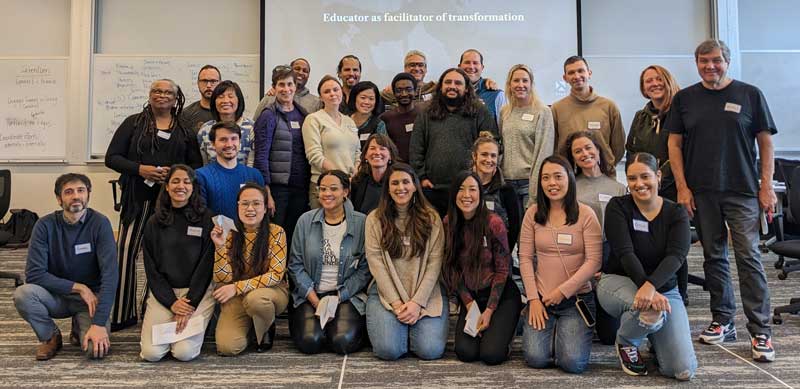
This poem was offered by one of the participants to summarize his experience of the two days and to think about reorientation:
Shoulders
by Naomi Shihab Nye
A man crosses the street in rain,
stepping gently, looking two times north and south,
because his son is asleep on his shoulder.
No car must splash him.
No car drive too near to his shadow.
This man carries the world’s most sensitive cargo
but he’s not marked.
Nowhere does his jacket say FRAGILE,
HANDLE WITH CARE.
His ear fills up with breathing.
He hears the hum of a boy’s dream
deep inside him.
We’re not going to be able
to live in this world
if we’re not willing to do what he’s doing
with one another.
The road will only be wide.
The rain will never stop falling.
